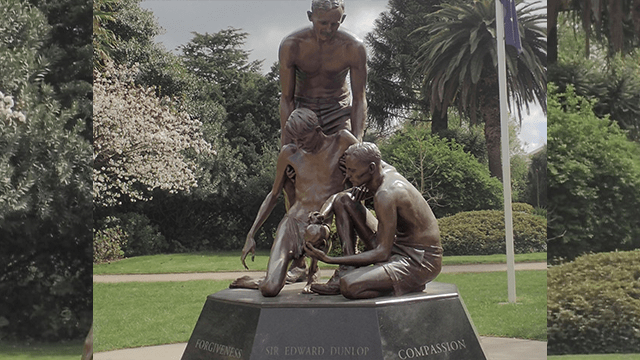
Sir Edward 'Weary' Dunlop Memorial (Victoria) - Photo courtesy M.Horne
At the time of Sir Edward ‘Weary’ Dunlop’s death in 1993, many asked: Why did Dunlop receive all the fame? Why did none of the other forty-three doctors, who were also prisoners of war on the Burma-Thailand railway, receive the same accolades as Dunlop? This pre-submission paper explores the processes that contributed to the making and shaping of the heroic reputation of this iconic figure within the Australian community both during and after his life. Using an approach that understands heroes as a social construction, Michèle’s thesis explores the contingent, constructed and contextual components that contributed to his status. Employing representations of Dunlop in print and film media, together with his extensive and eclectic archive at the Australian War Memorial, a picture emerges of advocacy and agency from the time he returned to Australia after the war to the present day. These processes contributed to his evolving status, which was heightened during the surge of interest in prisoner-of-war experiences throughout the ‘memory boom’ of the 1980s and 1990s.
Michèle Horne is a PhD candidate in the National Centre of Biography, School of History, at ANU. She graduated with an environmental science degree with honours in quantitative genetics from Griffith University, followed by postgraduate diplomas in education and applied computing. Michèle spent twenty years working in development aid projects in Indonesia and Lao PDR developing a deep interest in Australian-Asian relations. More recently she completed a Master of Studies at ANU, focusing on biography and history. With Katie Mills, she co-authored an article in Health and History and the Australian Dictionary of Biography entry for Sir Edward ‘Weary’ Dunlop.
Location
Speakers
- Michèle Horne (PhD candidate)
Event Series
Contact
- Ananyo Chakraborty